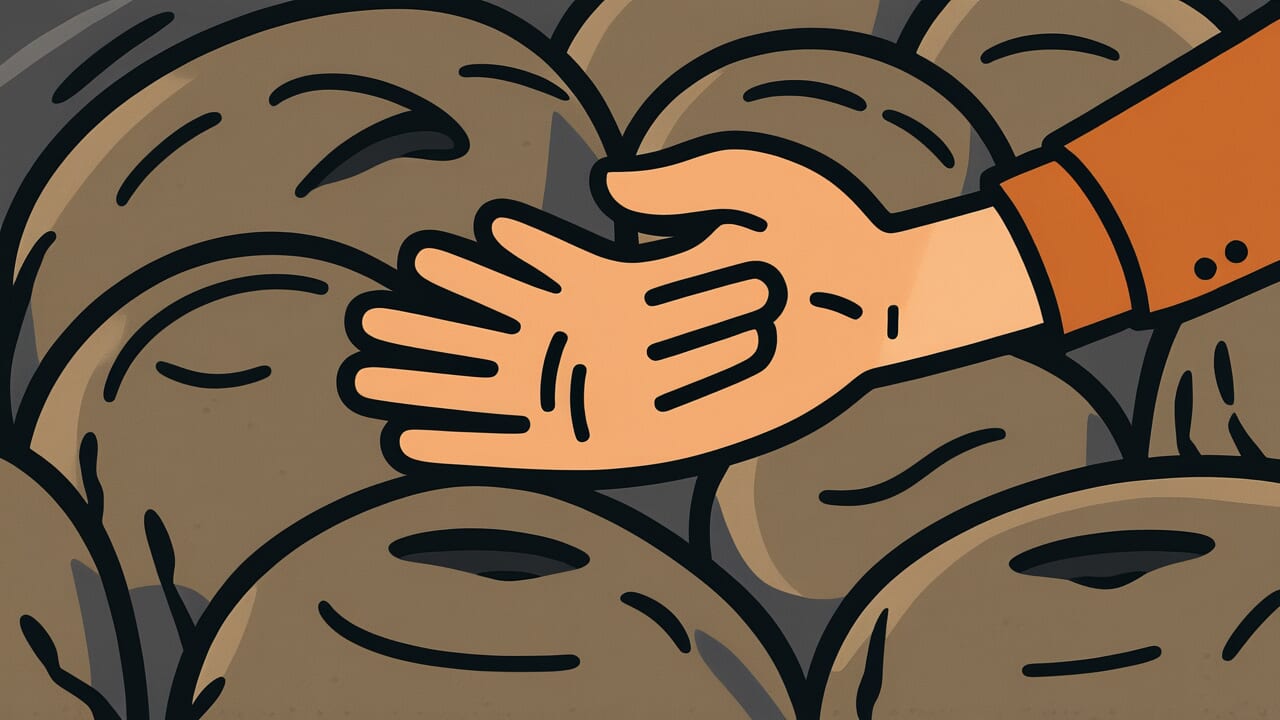How to Read “Clog one’s hand with stones”
いしでてをつめる
Meaning of “Clog one’s hand with stones”
“Clog one’s hand with stones” means to suffer harm from your own actions. In other words, it describes getting what you deserve or self-destruction.
It expresses situations where your own choices and decisions end up causing you suffering.
This proverb is used when you fall into difficulty because of your own deliberate actions, not because someone deceived you or bad luck struck.
For example, when you use dishonest methods to take shortcuts and end up with bigger problems instead. Or when you make rash decisions chasing quick profits and create an irreversible situation.
Even today, people use this expression to describe situations where they suffer from the results of their own actions.
It perfectly captures moments when you can’t blame anyone else. You’ve literally strangled yourself with your own hands. This proverb remains alive and relevant for expressing exactly these situations.
Origin and Etymology
The origin of “Clog one’s hand with stones” doesn’t appear in clear historical records. However, we can make interesting observations from how the phrase is constructed.
Let’s focus on the word “tsumeru” (clog/corner). In Japanese, this word has long described a state of being cornered with no room to move.
In shogi (Japanese chess), “tsumi” means checkmate—a situation with no escape.
The expression “Clog one’s hand with stones” probably depicts a situation in some work or action. Stones are hard and difficult to move.
Once you place them, you can’t easily move them again. Your own placed stones take away your freedom of movement.
This visual image became a metaphor for how your own actions can lead to results that make you suffer.
Traditional Japanese games and activities often involved using stones. Go is a prime example.
Once you place a stone, you cannot move it. One careless move can corner yourself. These everyday experiences may have created the foundation for this proverb.
Usage Examples
- Losing trust because of a careless lie is exactly like clogging one’s hand with stones
- He tried to gain profit through dishonest means and ended up clogging his hand with stones
Universal Wisdom
“Clog one’s hand with stones” shows us a harsh but natural truth. Every human action comes with consequences.
What’s interesting is this question: Why do people choose actions that will make them suffer, even when they know the outcome?
In most cases, people are driven by desires for immediate benefits or easy paths. They want shortcuts instead of honest effort.
They want escape routes instead of facing things sincerely. They want one big win instead of steady accumulation. In that moment, it seems like a smart choice.
But that very choice becomes the “stone” that corners you later.
This proverb has been passed down through generations because humans keep repeating this mistake. Look at history.
Countless rulers piled up lies to protect themselves. Merchants tried to gain profit through fraud. And they destroyed themselves through their own actions.
Times change, but the weakness lurking in human hearts remains the same.
Through this proverb, our ancestors send us a warning. Today’s easy choice becomes tomorrow’s chain that binds you.
At the same time, they teach us something important. Honesty and integrity are the best choices to protect yourself in the long run.
When AI Hears This
Blocking your own escape route should logically put you at a disadvantage. But in actual Go, creating this “no turning back” state becomes a powerful way to corner your opponent.
This is exactly what game theory calls the “commitment effect.”
Imagine a price negotiation where the buyer says “I only have 100,000 yen” and even shows bank statements. This looks like a foolish action that reduces your options.
But actually, it makes the seller think “I can’t get more from this person.” This creates a situation where the opponent must compromise.
Blocking your own escape route becomes a weapon that advances negotiations favorably.
Thomas Schelling, who won the Nobel Prize in Economics, expressed the essence of this strategy as “binding yourself to move others.”
In military strategy too, burning bridges to cut off retreat raises soldiers’ morale. It sends the enemy a message: “They have no choice but to fight desperately.”
What’s fascinating is that this strategy requires one absolute condition for success. The irreversibility must be clearly communicated to the opponent.
Placing a stone in Go cannot be undone, so the opponent understands “they’re serious.” In other words, here’s a paradox.
The action that takes away your freedom becomes the most strategic use of freedom.
Lessons for Today
“Clog one’s hand with stones” teaches us a basic truth. Every choice comes with responsibility.
Careless comments on social media, cutting corners at work, dishonest attitudes in relationships—these might feel easier temporarily. But they eventually bring results that make you suffer.
Modern society especially makes information easy to record and spread. Mistakes that might have been forgotten in the past now remain long in the digital world.
That’s why it’s important to develop a habit. Think about how your choices right now will affect your future self.
But this proverb isn’t just a warning. Flip it around, and it’s also a message of hope.
By accumulating honest actions, you can help your future self. Living honestly, carefully, and sincerely may look like a detour.
But it’s actually the shortest path to protecting yourself. Your choices today create tomorrow’s you.
So don’t lay stones that will make you suffer. Instead, build a foundation that will support you.



Comments